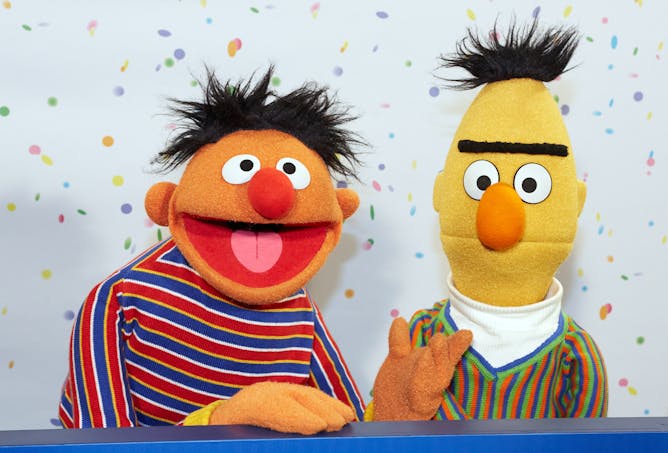|
|
|
Editor's note
|
|
If you are anything like me, you will have been transfixed by the debate surrounding the nomination of Brett Kavanaugh to the US Supreme Court. The process has been dominated by accusations of sexual assault by several women, and the detailed testimony of one of them. History shows that difficult nomination processes have often been followed by controversial rulings, as Calvin Schermerhorn of Arizona State University writes here. Be sure to
follow the coverage from our colleagues in the US.
Sesame Street characters Bert and Ernie have been gay icons since they first appeared on screens in the early 1960s (there was even a campaign in 2011 to get them to marry following the legalisation of gay marriage in New York). But this week the people behind the children’s show said the pair are simply good friends who teach youngsters the importance of getting on with everyone, no matter how different they are. Whatever the case, research shows that, on the whole, children watching the show get the main message loud and clear.
The Ryder Cup is underway, pitting Europe’s top golfers against the best the US can produce. But only a few of the stars on display will be using the latest research from the field of neuroscience which demonstrates that you really can train your brain to be better at putting.
And, talking of training the brain, why not pit yours against this week’s mind boggling logic brainteaser (the answer will be published on Monday).
|
Jonathan Este
Associate Editor, Arts + Culture Editor
|

|
|
|
|

Supreme Court nominee Brett Kavanaugh at the Senate Judiciary Committee hearing, Sept. 27, 2018.
AP/pool image, Michael Reynolds
Calvin Schermerhorn, Arizona State University
Contentious or politically driven Supreme Court nominations are not new. But US history shows that many of those contested nominees who were confirmed would go on to author controversial opinions.
|

GEORG WENDT/EPA
Kerrie Lee, University of Hull
Learning to form friendships is a key part of growing up.
|

Listen to your brain.
OtmarW/shutterstock
Andrew Michael Cooke, Bangor University
How to win the Ryder Cup...with a little help from neuroscience.
|

So, I am…
Shutterstock
Mark Jago, University of Nottingham
No cheating, please.
|

Hyejin Kang / Shutterstock
Sandy Brian Hager, City, University of London
A critical review of research into inequality shows the formula for reducing it is surprisingly simple.
|

Phonlamai Photo/Shutterstock
Eleni Vasilaki, University of Sheffield
Those warning about a machine takeover typically assume AI will develop super intelligence. Here's what the science says.
|
|
|
-
Lois Lee, University of Kent
'I don't believe in God, I believe in science,' atheists often argue. But that doesn't mean their thinking is evidence-based.
-
Lisa Lazard, The Open University
Compared to how prevalent sexual harassment is, false claims are rare.
-
James Peacock, Keele University
Have you ever read a novel in the second person? You probably found it strange.
-
Helena Bassil-Mozorow, Glasgow Caledonian University
Phoebe Waller-Bridge's funny, sassy, violent script doesn't make a drama out of the two strong female leads, it normalises them.
-
Nicholas Clapham, University of Surrey
From cannibalism to carbolic smoke balls, these are some of the fascinating cases that have made the law of England and Wales what it is today.
-
Ken Chitwood, University of Florida
Hosay, a religious ritual performed by Trinidadian Muslims, combines the somber Islamic observance of Ashura, brought by immigrant Indians, and the joy of Trinidad's famous carnival.
|
|
| |
| |
| |
| |

|
| |
| |
| |
Featured events
|

|
Scottish Parliament, Edinburgh, Edinburgh, City of, EH99 1SP, United Kingdom — The Conversation
|

|
University of East Anglia, Norwich, Norfolk, NR4 7TJ, United Kingdom — University of East Anglia
|

|
Royal Holloway, University of London, Egham, Surrey, TW20 0EX, United Kingdom — Royal Holloway
|

|
Samuel Alexander Building, University of Manchester, Oxford Road, Manchester, Manchester, M13 9PL, United Kingdom — University of Manchester
|
|
|
|
| |
| |
| |
| |
| |
|
|
|
|
|
|
|